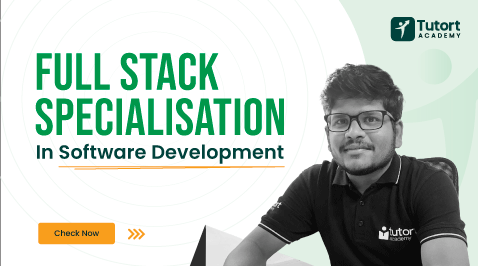Switching careers can seem intimidating, especially when stepping into the tech industry. However, becoming a Full Stack Developer without a computer science degree is not only possible, but it's also becoming more common. Today, many professionals, whether from marketing, sales, or finance, are transitioning to web development. Thanks to the abundance of resources and structured programs available, you can start your journey toward mastering full stack development, all without traditional formal education in computer science.
But why choose this career path, and how can you make the switch? Let’s break it down step by step to answer the "what," "why," and "how" of this promising field.
What is Full Stack Development?
Full Stack Development refers to a developer’s ability to work on both the front-end and back-end of a website or application. This means mastering technologies like HTML, CSS, JavaScript, databases, and server management. The skills of a full stack developer are highly valued because of their versatility. From designing a seamless user experience on the front end to managing databases and servers on the back end, a full stack developer is equipped to handle it all.
Why Choose Full Stack Development?
Full stack development is an exciting field for several reasons. Firstly, the demand for web developers continues to rise, especially in industries like e-commerce, healthcare, and fintech. Companies are constantly looking for skilled professionals who can design, build, and maintain websites and applications, offering significant job security and growth opportunities.
Moreover, you don’t need a formal degree in computer science to succeed. Employers are more focused on what you can do rather than the degree you hold. If you can demonstrate your proficiency through projects, portfolios, and hands-on experience, you’re already ahead of the game.
How to Become a Full Stack Developer Without a Computer Science Degree
Switching to a career in full stack development is highly achievable if you take the right steps. Here’s a structured roadmap that will guide you from being a novice to a proficient developer:
1. Start with Front-End Basics
The journey usually begins with mastering front-end technologies like HTML, CSS, and JavaScript. These are the building blocks of any website, and learning them first gives you a strong foundation. You can begin by enrolling in online courses or free tutorials that cover these languages in depth. Websites like freeCodeCamp and Codecademy are popular choices for beginners.
2. Learn Back-End Technologies
Next, focus on back-end development, which involves working with servers, databases, and APIs. Here, you’ll need to pick up languages like Node.js, Python, or Ruby and frameworks like Django or Express. This is where you’ll learn how to manage data and ensure smooth communication between your website and servers.
3. Understand Databases
Databases are crucial for any web application, so learning how to manage them is a must. Start with SQL and NoSQL databases like MySQL or MongoDB. Understanding how to fetch, store, and update data will make you a well-rounded developer.
4. Work on Projects
The best way to solidify your learning is by building real-world projects. Create a personal website, develop a small e-commerce platform, or contribute to open-source projects. These hands-on experiences are invaluable and serve as portfolio pieces when applying for jobs.
5. Join a Full Stack Developer Course in Hyderabad
One way to fast-track your career switch is by enrolling in a Full Stack Developer Course in Hyderabad. Such courses are designed for working professionals who want to gain hands-on training in both front-end and back-end technologies. They offer structured modules, mentorship, and job placement assistance, helping you land roles in top companies. Courses like these also give you the opportunity to work on real-life projects, which will bolster your resume and increase your employability.
6. Build a Portfolio
As you develop your skills, start compiling your projects into a portfolio. This will act as your visual resume and allow potential employers to see your work firsthand. Include all the key projects you’ve worked on, especially those that demonstrate both front-end and back-end proficiency.
7. Networking and Job Applications
Networking is a powerful tool for career changers. Attend tech meetups, webinars, and connect with other developers on platforms like LinkedIn and GitHub. This helps you stay informed about job opportunities and industry trends. When you’re ready, apply to entry-level developer roles or internships that align with your skillset.
How a Full Stack Developer Course Can Help You Succeed
Taking a Full Stack Developer Course in Hyderabad offers several advantages, particularly for working professionals. These courses are designed to be flexible, allowing you to learn part-time or through weekend classes, so you can continue working while upgrading your skills. Furthermore, the structured curriculum ensures you don’t miss any key areas of full stack development, whether it’s learning about databases, front-end design, or cloud services.
Hands-on projects are often a critical component of these courses, giving you the practical experience needed to stand out in job interviews. With experienced instructors and peer support, you’ll be able to solve complex problems and build a strong foundation in web development.
Moreover, many full stack courses come with career support, offering resume reviews, mock interviews, and job placement assistance. Companies that regularly hire full stack developers value candidates who come with practical training, making this type of course an excellent investment.
Conclusion
Transitioning to full stack development without a computer science degree is not only feasible but also a highly rewarding career move. By following a structured learning path, gaining hands-on experience, and leveraging resources like a Full Stack Developer Course in Hyderabad, you can build a solid foundation for success. Whether you're a working professional or someone looking for a fresh start, full stack development offers a promising future.






Comments